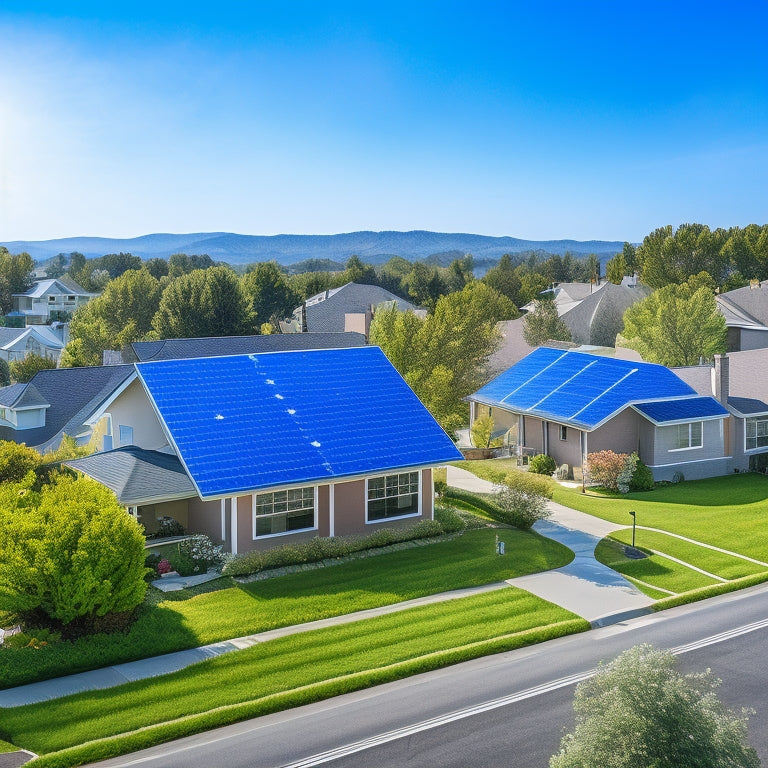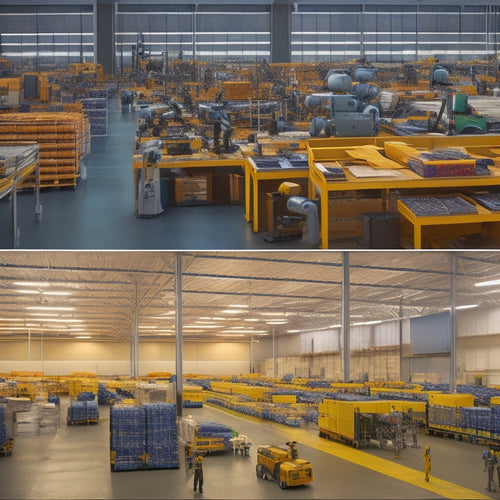
Calculate Your Residential Solar Panel Installation Cost
Share
To calculate your residential solar panel installation cost, consider seven key factors. You'll need to assess your energy consumption patterns, evaluate your roof's size and orientation, and determine the best system size and design for your needs. Research local incentives and rebates, and choose the most suitable solar panels for your installation. Installation labor fees and maintenance costs will also impact your overall cost. Additionally, consider adding a battery backup system for consistent electricity during power outages. As you factor in these elements, you'll get a clearer picture of your total installation cost - and the potential savings that come with it.
Key Takeaways
• Determine your energy consumption patterns to identify the required number of solar panels and system size.
• Consider system design, energy output, and roof space to balance panel quantity and quality.
• Factor in installation costs and labor fees, ranging from $2.50 to $3.50 per watt, depending on permit fees and installer expertise.
• Add 15% to 20% to the total cost for monitoring, maintenance, and potential battery backup systems.
• Leverage federal and state tax credits, ranging from 26% to 46% of the total installation cost, to maximize savings.
Determining Your Solar Needs
To determine your solar needs, you'll need to assess your energy consumption patterns and identify the number of solar panels required to meet your energy demands. This is where Solar Readiness comes in - an essential step in understanding your energy requirements.
An energy audit is vital to evaluate your energy usage and identify areas of inefficiency. This involves analyzing your past utility bills, inspecting your home's insulation, windows, and lighting, and identifying energy-wasting appliances. By conducting an energy audit, you'll gain a clear understanding of your energy consumption patterns, which will help you determine the size of the solar panel system you need. This, in turn, will enable you to calculate the number of solar panels required to meet your energy demands.
A thorough energy audit will provide you with a clear picture of your energy usage, helping you make informed decisions about your solar panel installation. With this information, you'll be well on your way to determining your solar needs and taking the first step towards a more sustainable energy future.
Understanding System Size and Cost
As you explore your solar panel installation options, you'll need to contemplate the system size that's right for your home.
The number of panels you need will have a substantial impact on the overall cost, so it's crucial to get it just right.
System Size Matters
Your residential solar panel installation cost largely depends on the size of the system you need, which in turn is determined by your energy requirements and available roof space. A larger system means more panels, which translates to higher costs. However, a bigger system can also generate more electricity, reducing your reliance on the grid and increasing your energy independence.
When it comes to system size, you need to take into account the following factors:
-
System Design: A well-designed system can maximize energy output while minimizing costs. A professional installer will assess your energy needs and roof space to design a system that meets your requirements.
-
Energy Output: The size of your system determines how much energy it can produce. A larger system can generate more electricity, but it also means higher upfront costs.
-
Roof Space: The available space on your roof limits the size of your system. A larger roof can accommodate more panels, increasing energy output and reducing your reliance on the grid.
Panel Quantity Affects Cost
The number of solar panels required to meet your energy needs directly impacts the overall cost of your residential solar panel installation. You'll need to determine the ideal system size to power your home, taking into account factors like your energy usage, roof size, and local building codes.
A larger system will require more panels, increasing the upfront cost. However, a bigger system also means more energy production, which can lead to greater long-term savings. It's important to strike a balance between panel quantity and quality.
A higher quantity of lower-quality panels might be cheaper upfront, but they may not perform as efficiently or last as long as fewer, high-quality panels. Quantity variance significantly affects the overall cost, so it's important to assess your energy needs accurately.
Efficiency Impacts Pricing
Determine the best system size by evaluating the efficiency of your solar panels, as a higher efficiency rating can greatly reduce the number of panels required, thereby lowering the overall cost. This is important because a more efficient system can provide the same amount of energy with fewer panels, resulting in significant cost savings.
Here are some key points to keep in mind when assessing efficiency:
-
Higher efficiency panels often come with a cost premium, but they can provide more energy savings in the long run.
-
System size and efficiency are closely linked, as a more efficient system requires fewer panels to produce the same amount of energy.
-
Energy savings can be substantial with high-efficiency panels, especially in areas with limited roof space or high electricity rates.
Roof Size and Orientation Impact
As you evaluate your residential solar panel installation, roof size and orientation emerge as critical factors influencing the overall cost and efficiency of the system.
A larger roof size typically requires more solar panels, increasing the installation cost. However, a larger roof also provides more space for panels, potentially leading to greater energy production.
Roof orientation is equally important, as it affects the amount of sunlight your solar panels receive. A south-facing roof with minimal shading is ideal, as it receives direct sunlight throughout the day. On the other hand, a roof with obstructions, such as chimneys or skylights, may require more complex installations, increasing the cost.
A thorough shading analysis is essential to identify potential issues and optimize panel placement. A professional solar installer will conduct a shading analysis to determine the best panel configuration for your roof. They'll assess factors like roof size, orientation, and obstructions to maximize energy production.
Local Incentives and Rebates Available
You can greatly reduce your residential solar panel installation cost by taking advantage of local incentives and rebates available in your area. These incentives can markedly lower your upfront costs, making solar energy a more accessible and affordable option.
-
Utility Discounts: Many utility companies offer discounts to customers who install solar panels, which can help reduce your electricity bills.
-
Government Grants: The government provides grants to homeowners who invest in renewable energy sources, including solar power.
-
State and Local Rebates: Many states and local governments offer rebates to homeowners who install solar panels, which can help offset the installation cost.
It's essential to research and explore the local incentives and rebates available in your area to maximize your savings. By taking advantage of these incentives, you can reduce your residential solar panel installation cost and start enjoying the benefits of solar energy sooner.
Choosing the Right Solar Panels
When choosing solar panels for your residential installation, you'll want to evaluate the panel efficiency ratings, as they directly impact the system's overall performance.
You'll also need to compare different brands and models to find the best fit for your specific needs and budget.
Panel Efficiency Ratings
When evaluating panel efficiency ratings, it's important to keep in mind the percentage of sunlight that's converted into electricity, which directly impacts the amount of electricity your solar panel system produces. Choosing the right solar panels for your residential installation is essential to maximize your energy harvest and power output.
To achieve this, you need to take into account the panel efficiency ratings, which represent the percentage of sunlight that's converted into electricity. A higher rating indicates more energy production per unit area.
Here are some key aspects to bear in mind when assessing panel efficiency ratings:
-
Higher efficiency ratings allow for more energy production in smaller spaces.
-
Improved energy density means you can generate more power with fewer panels.
-
Increased energy yield results in higher savings on your electricity bill.
Brand Comparison Guide
Comparing top solar panel brands is crucial to finding the best fit for your residential installation, taking into account factors like warranty, durability, and price point. You'll want to research and compare the top brands to make sure you're getting the best value for your money.
Warranty variations between brands can be significant, with some offering up to 25-year warranties, while others may only offer 10. You'll also want to take into consideration customer reviews to get a sense of each brand's reliability and performance.
Some top brands, like Panasonic and SunPower, are known for their high-efficiency panels, but come at a higher price point. Others, like Trina and Hanwha, offer more affordable options without sacrificing too much in terms of efficiency.
When comparing brands, think about your specific needs and priorities. Are you looking for the most efficient panels, or are you on a tighter budget? By weighing your options and doing your research, you can find the perfect fit for your residential solar panel installation.
Installation Costs and Labor Fees
Understanding the overall solar panel budget allocation towards installation costs and labor fees is crucial, particularly given that these expenses typically range from $2.50 to $3.50 per watt, depending on the complexity of the installation and the expertise of the installer. When planning your residential solar panel installation, factoring in these costs is imperative to obtain an accurate estimate of your total expenditure.
Various factors contribute to the total installation costs and labor fees. These factors encompass:
- Permit fees, inspection costs, and insurance premiums, all of which contribute to the overall expense
- Workmanship guarantees, which may vary depending on the installer's reputation and expertise
- Crew sizes, union labor, and overtime pay, all of which can impact the labor costs
It is important to note that travel fees may also be applicable, particularly if the installation site is situated far from the installer's operational base.
Monitoring and Maintenance Expenses
Your residential solar panel system requires regular monitoring and maintenance to guarantee peak performance, and you'll need to budget for these ongoing expenses, which can range from $400 to $1,000 per year, depending on the complexity of your system and the frequency of maintenance visits. These costs will ensure your system operates at its best, maximizing your energy savings and reducing your carbon footprint.
Routine inspections are essential to identify potential issues before they become major problems. These inspections typically occur every 6-12 months and may include energy audits to assess your system's performance and identify areas for improvement. Energy audits can help you optimize your energy usage, reducing waste and increasing your system's overall efficiency.
You'll need to factor these expenses into your overall budget to ensure your system continues to perform at its best. Be sure to research and compare prices from different providers to find the best option for your system and budget.
Battery Backup System Add-ons
By incorporating a battery backup system into your residential solar panel installation, you can secure a consistent supply of electricity during power outages and grid failures. This add-on is essential for homeowners who want to guarantee their energy independence and backup power.
With energy storage solutions, you can store excess energy generated by your solar panels during the day and use it at night or during outages.
Here are some key benefits of battery backup systems:
-
Extended Backup Power: Enjoy extended backup power during prolonged grid outages, keeping your essential appliances running smoothly.
-
Energy Storage Flexibility: Store excess energy generated during the day for later use, reducing your reliance on the grid.
-
Reduced Energy Waste: Minimize energy waste by storing excess energy generated by your solar panels, reducing your carbon footprint.
Federal and State Tax Credits
As a residential solar panel installation owner, you're eligible for federal and state tax credits that greatly diminish your upfront costs. These tax incentives can notably impact your return on investment, making solar energy a more attractive option.
Federal and State Tax Credits Breakdown
| Tax Credit | Credit Amount |
|---|---|
| Federal Solar Investment Tax Credit (ITC) | 26% of total installation cost |
| State Tax Credit (varies by state) | 10% to 20% of total installation cost |
| Total Potential Tax Credit | 36% to 46% of total installation cost |
To be eligible for these credits, you must meet specific requirements. For the Federal ITC, you must have a tax liability and own the solar panel system. For state tax credits, eligibility varies by state, but typically requires residency and ownership of the system. By taking advantage of these credits, you can significantly reduce your upfront costs and accelerate your return on investment. Be sure to consult with a tax professional to make sure you meet the necessary credit eligibility requirements.
Frequently Asked Questions
Can I Install Solar Panels on a Rented Property?
You'll need to take into account renter's rights and negotiate landlord agreements before installing solar panels on a rented property, ensuring you understand the terms and responsibilities of both parties involved.
How Long Does a Typical Solar Panel Installation Take?
You'll typically wait 3-5 days for a solar panel installation, but permit issues and labor costs can extend this timeframe, so plan accordingly to guarantee a smooth shift to renewable energy.
Are Solar Panels Resistant to Extreme Weather Conditions?
You'll be relieved to know that solar panels are designed to withstand extreme weather conditions, boasting impressive storm durability and weather resistance, ensuring your power generation remains uninterrupted even in harsh climates.
Can I Install Solar Panels on a Metal Roof?
As you gaze up at your metal roof, you wonder: can solar panels call it home? Fortunately, yes - most metal roofing materials are compatible with solar panels, ensuring a seamless, energy-generating fusion.
Do Solar Panels Increase My Property's Value?
You'll be pleased to know that solar panels likely increase your property's value, as a property appraisal will reflect the upgrade, and neighborhood aesthetics will appreciate the modern, eco-friendly appeal.
Related Posts
-

Find Your Eco-Friendly Motorcycle for a Sustainable Ride
You're shifting gears towards a more sustainable ride, opting for an eco-friendly motorcycle that combines thrill wit...
-

What's the Best Green Ride for College Budgets?
As a college student on a budget, you're likely looking for an eco-friendly ride that won't break the bank. You've go...
-

Why Are Online Prices for Panels So Low?
When you buy panels online, you're often taking advantage of a combination of factors that drive prices lower. You're...


